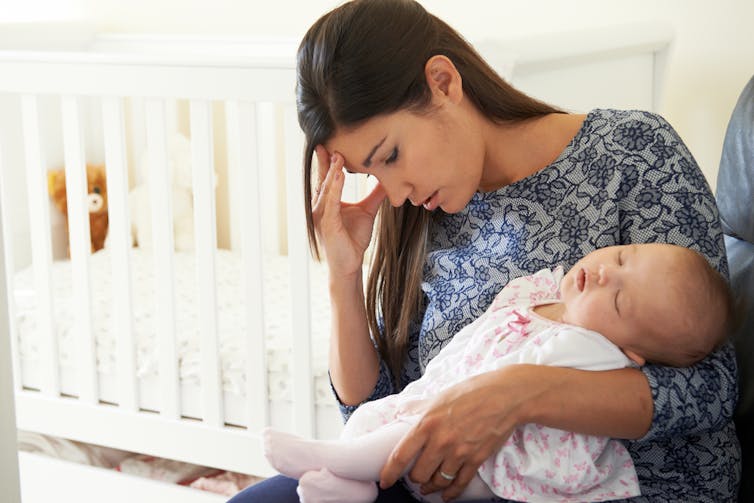Children of depressed mothers are likely to experience health issues and a delay in cognitive development.

It’s common for some women to experience depression during pregnancy and after giving birth. Globally, almost one in eight mothers suffer from depression, either during pregnancy or afterwards. In low- and middle-income countries, the rate can increase to one in three women.
Some of us perhaps have heard many stories of pregnancy-related depression from friends and relatives. Some of these stories have tragic endings such as suicides and homicides.
During a recent informal sharing session between Indonesian graduate students at Melbourne University, I discovered all of my female friends suffered from depression when they became mothers.
The hardest thing for each new mother was to cope with the depression by herself. The common signs of depression are feeling sad and pessimistic about the future as well as low energy and vitality. They thought feeling depressed was seen as a normal cycle of being a mother and that complaining about this would mean they weren’t being a good mother.
Not all women realise they are experiencing symptoms of depression. They feel sorrowful but clueless about why and what to do. Most try to ignore the problem and pretend that everything is fine. Only a few try to seek help.
The cause of unhappiness

Socio-cultural pressures that shape the definition of a good mother also contribute to women’s depression. Photo: Shutterstock
Excessive worry about the safety of the baby can cause depression in pregnant women and breastfeeding mothers. Some mothers have vague fears that something bad will happen to the baby.
Women’s lack of confidence in their ability to take care of the baby also contributes to depression. Some women feel inadequate and not ready to become a mother because they are not confident about their knowledge of pregnancy and how to raise a baby. These doubts can become more pronounced in women who experience economic hardship.
Socio-cultural pressures that shape the definition of a good mother also contribute to women’s depression.
The impacts

Depressed mothers can cause stress in babies. Photo: Shutterstock
Unhappy pregnant women and breastfeeding mothers will disrupt mother-infant relationships. The negative emotion not only affects the mothers but also the babies.
Pregnant women with depression are less likely to care for their own needs. They lack appetite and therefore have a risk of poor nutrition.
In turn, this can lead to an increased risk of babies with low birth weight. Low birth weight can cause major health concerns, including a delay in psychological development, stunting, chronic diseases and even child mortality.
Babies and children of depressed mothers are likely to experience health issues. Besides low birth weight, the babies may suffer from small head size and eating and sleeping disorders. In some countries, depression in mothers is also associated with diarrhoea episodes and incomplete immunisation programs.
Children of depressed mothers may experience a delay in cognitive development, such as language delays and even lower IQs.
All of these risks may have prolonged effects until adolescence.
Depression in mothers also affects their breast-milk production. Friends have told me that they cannot produce breast milk at all when they are depressed. This situation will prevent babies from reaping the full benefits of nutrients from breast milk, hindering their growth and development.
Depressed mothers also have difficulties in accurately perceiving their baby’s emotional expression. This can cause stress in babies as mothers do not respond to their needs properly. These mothers may see themselves as incompetent, a judgment that can cause their condition to deteriorate further.
Overall, these impacts may add to the financial burdens on the family as they have to budget for health care costs for children whose health problems may affect them for the rest of their lives.
Cognitive development delays also have consequences such as extra cost for special education and other treatments. Parents may also lose their productive time because they need extra time to care for their children.
What to do
It is important to pay attention to the emotional life of mothers.
Many mothers in Indonesia believe that their babies’ needs are more important than theirs. This belief leads many women to abandon their emotional health for the sake of their children. Before finding support from others, it is important for mothers to admit they suffer from depression.
Care and support to ensure mothers’ happiness during the periods of pregnancy and breastfeeding are incredibly important. The first support should come from the family.
Husbands have a key role to play in helping depressed mothers. They must develop acceptance and nonjudgmental attitudes to help their partners. As mothers feel they are being understood, they can start to overcome their problems on a daily basis at home before seeking professional help.

Husbands play an important role in supporting the mental health of women during pregnancy and after giving birth. Photo: Shutterstock
Another support should come from local health care centres and their workers. Indonesia has developed a guideline that highlights the role of local health workers in identifying and helping depressed mothers with their problems.
My current research on the role of these health workers in Surabaya, East Java, finds that their work is not optimised in supporting mothers with depression, despite the rise of public awareness on the issue. The latest research finds that at least one in five women in Surabaya suffer from postnatal depression.
Under the national guideline, local health centres are encouraged to provide a specific service for women to share their feelings. Community health workers are required to undergo training to provide psychological support for mothers suffering from depression.
However, Indonesia lacks the data to monitor and evaluate the implementation of the guidelines. This is another issue to cover. With good data we would be able to find what’s missing and improve services for depressed mothers.
Endang Surjaningrum, Lecturer in Psychology, Universitas Airlangga
This article was originally published on The Conversation. Read the original article.






